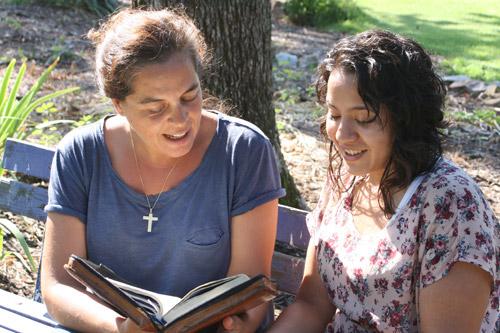Dear commenters
I have received a few comments, but I have not published them because they are not in the English language. All comments must be written in English. If you are unable to write in English, please get someone who can help you.
Thank you,
Diana
Sisters and Brothers: In the face of recent events undertaken by the U.S. District Court of Guam, the U.S. Supreme Court and the 33rd Guam Legislature in redefining marriage, the Church stands firm on her teaching that marriage is between one man, and one woman. While the Church does not agree with the decisions taken by the courts, or those taken by our local legislators, disagreement is not discrimination. These recent laws force the People of Guam, and of the United States, to either agree with a particular political position, or face ridicule and sanction for discrimination. These types of laws not only undermine the precepts of the United States Constitution to Freedom of Speech, but also undermines and attempts to eradicate the Constitutional Right to Freedom of Religion – we are living in dangerous times, under the law of man, where Catholics, and Christians alike, are commanded to forfeit our religious beliefs.
These times compel the Church to expose the intentions of those who have deceivingly disguised same-sex unions, as an issue of equality and anti-discrimination. It is important to understand that the political pressure to push the agenda for same sex “marriage” has never been about gay rights; the true intention behind this agenda has always been about the destruction of the family, and the imposition of a totalitarian system. The approval of same-sex “marriage” has now thrown open the doors of Guam to implement in our community a very clever and systematic theory, which has as its aim the destruction of marriage and family through the annihilation of any sexual differences among persons, this theory is known as the “Theory of Gender.”
These times compel the Church to expose the intentions of those who have deceivingly disguised same-sex unions, as an issue of equality and anti-discrimination. It is important to understand that the political pressure to push the agenda for same sex “marriage” has never been about gay rights; the true intention behind this agenda has always been about the destruction of the family, and the imposition of a totalitarian system. The approval of same-sex “marriage” has now thrown open the doors of Guam to implement in our community a very clever and systematic theory, which has as its aim the destruction of marriage and family through the annihilation of any sexual differences among persons, this theory is known as the “Theory of Gender.”
At the political level, in order to avoid “discrimination” among the genders, a principle of “equality,” or more specifically, a “radical equality” has been imposed upon society, demanding and forcing society to have a neutral response to gender; any objection is considered not only discriminatory, and intolerant, but bigotry.
The next step will be to implement this theory in the educational system of Guam. This means that our children, your children, will be forced to assimilate to this pattern of non-gender; that there is no-such-thing as “male” or “female”; they will be encouraged to explore their sexuality earlier, and parents will have no voice in the education of their children. The natural family will be seen as a threat for the “new age.” These ideas are already part of an international agenda promoted especially by the United Nations. The laws just passed on our beautiful island, which were disguised to fight against discrimination, will now work to subvert our human sexuality from the most tender age with the goal to abolish the natural family and create new “models” of a family.
I truly believe we are being led astray like lambs to a slaughter. In my view, these recent laws are not a sign of human progress, but are dangerous steps toward annihilation of our fundamental religious beliefs. As Shepherd of the local Church of Guam, I urge every person to be mindful that each of us is answerable to the Supreme Judge for what we do, and do not do. I invite all the Faithful, including those in every branch of our local government, not to deny your faith, but to have the courage to be a witness to the truth: the truth about life, about man, about marriage and about family. Do not be afraid! Christ is the truth, and the truth will set us free.
Servus tuus,
Most Rev. Anthony Sablan Apuron, OFM Cap., D.D.,
Archbishop of Agana
August 19, 2015

